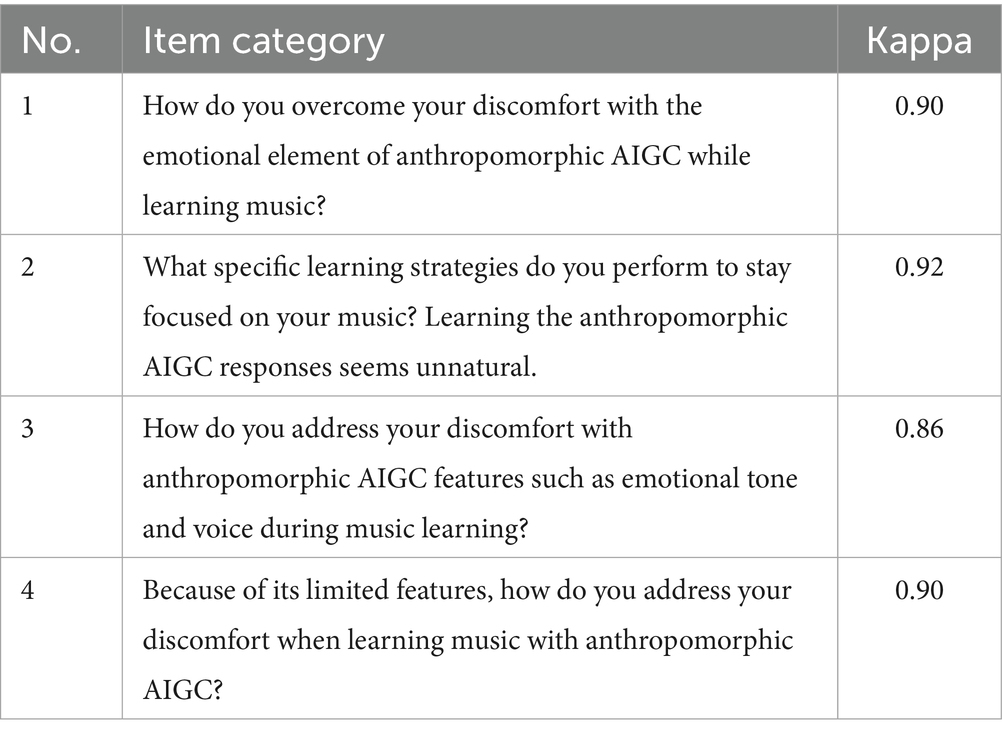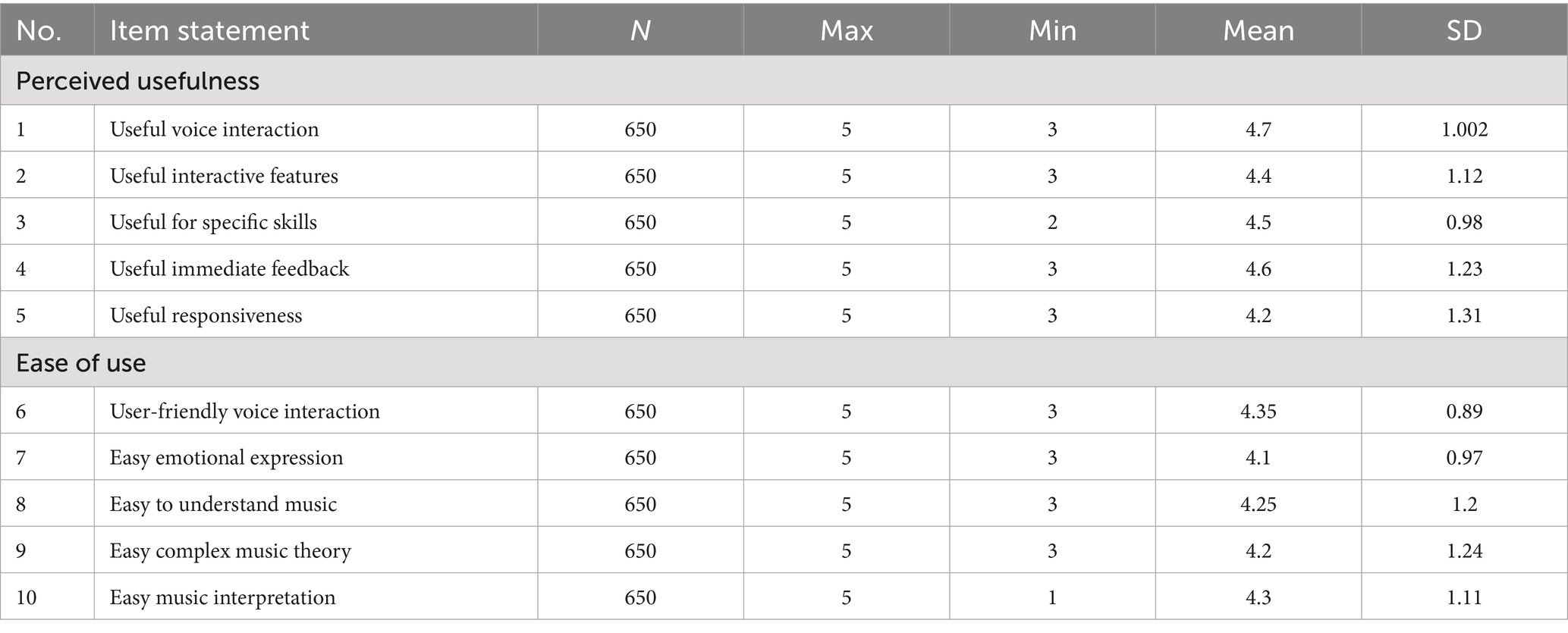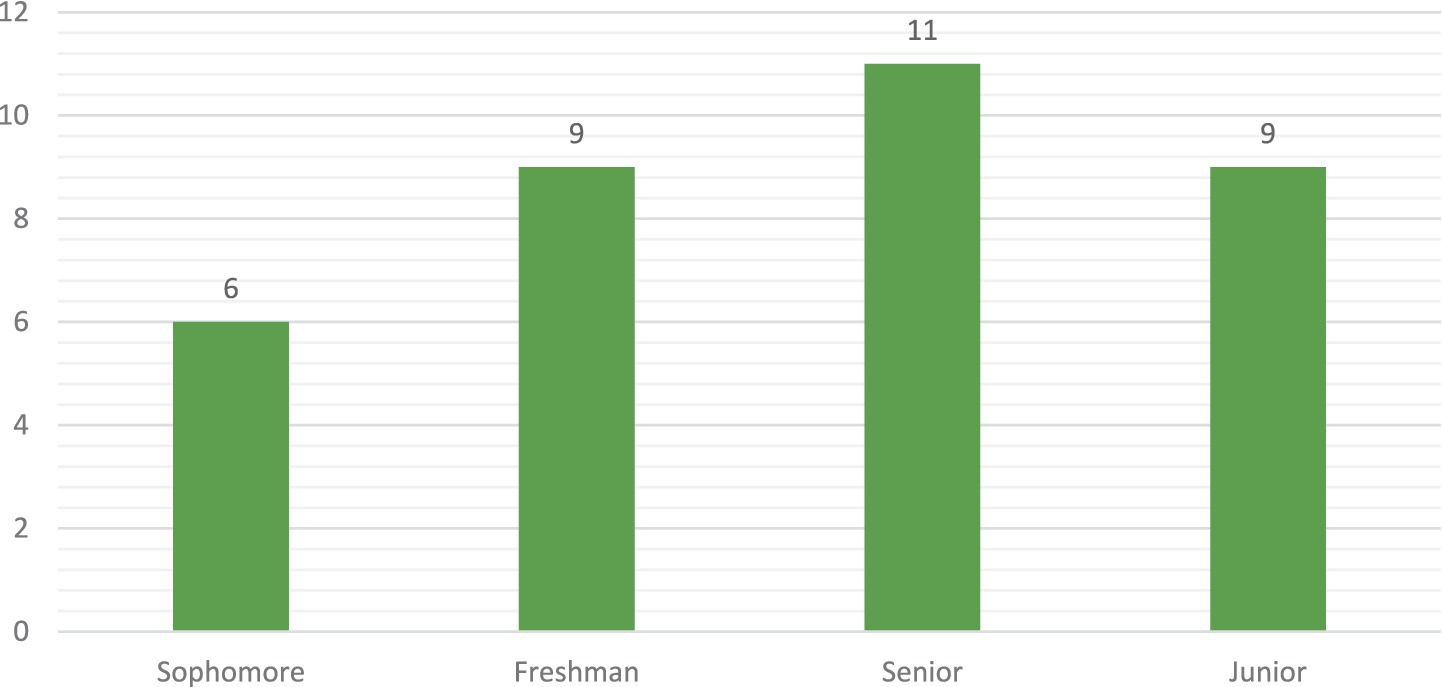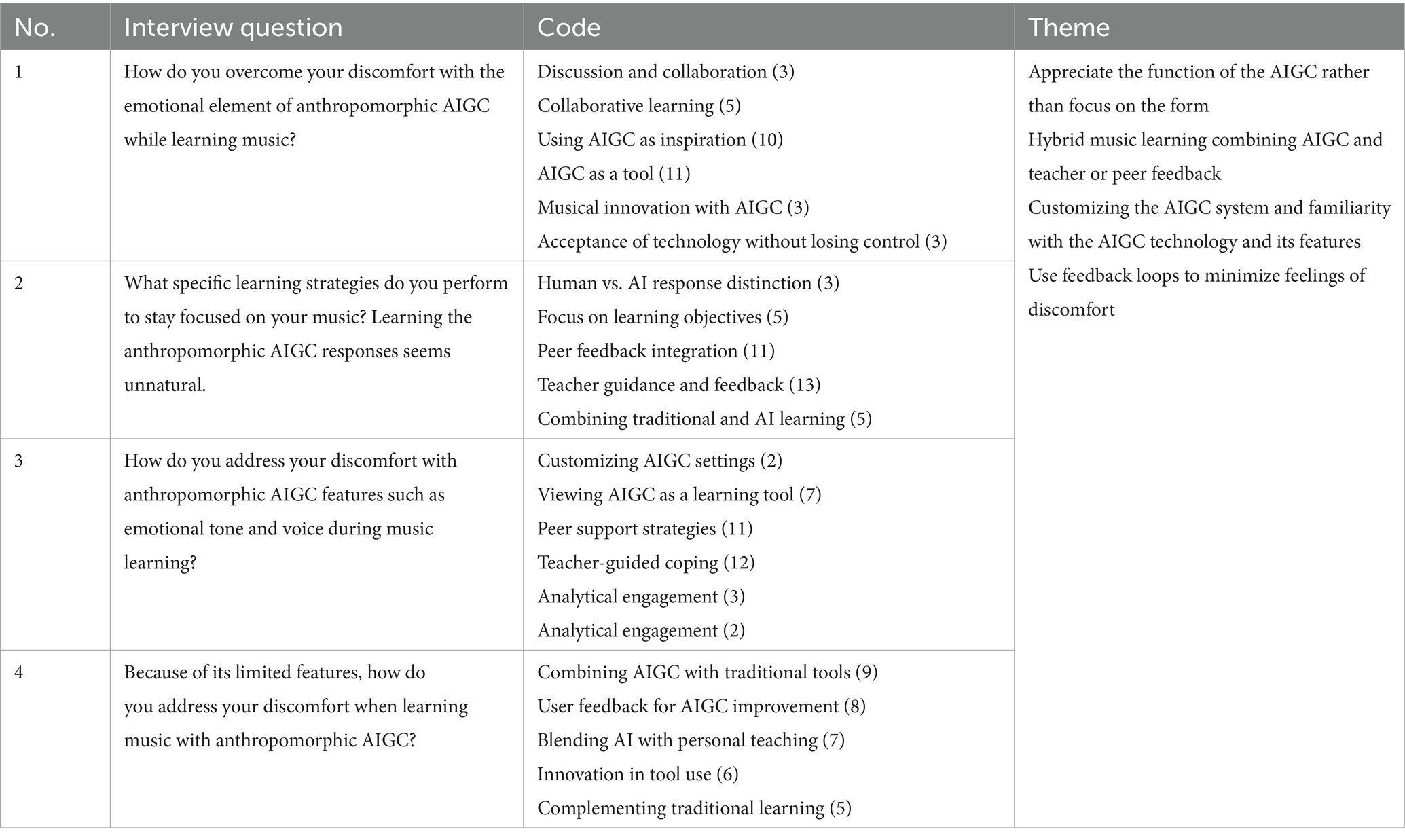- 1Department of Education and Society, Institute of Science Innovation and Culture, Rajamangala University of Technology Krungthep, Bangkok, Thailand
- 2Institute of Science Innovation and Culture, Rajamangala University of Technology Krungthep, Bangkok, Thailand
- 3Department of Mathematics Education, Faculty of Mathematics and Natural Sciences, Universitas Negeri Surabaya, Surabaya, Indonesia
This study investigates how Chinese undergraduate music students’ perceptions of AI-generated content (AIGC) are affected by generative artificial intelligence (GAI). To explain students’ acceptance of generative AI, the study integrates the Stimulus–Organism–Response (SOR) framework with the Technology Acceptance Model (TAM) and the Unified Theory of Acceptance and Use of Technology (UTAUT). A mixed-method approach was employed, involving 600 university students through quantitative surveys and qualitative interviews. The analysis explores students’ responses to the uncanny valley effect, perceived usefulness and ease of use of anthropomorphic features, and intention to adopt the technology. Findings indicate that although the human-like aspects of AIGC cause discomfort, quantitative data show that students find components like voice interaction and emotional expression helpful for learning music. Qualitative evidence further reveals adaptive strategies to mitigate discomfort, including integrating AIGC with peer review. The study concludes that AIGC holds significant potential for enhancing music education but underscores the need to address the uncanny valley effect to foster greater emotional engagement. To better accommodate diverse student needs, future research should investigate potential long-term effects and support the development of customized AIGC tools.
Introduction
With the rapid advancement of artificial intelligence (AI), generative artificial intelligence (GAI) has emerged as a transformative force in both academia and industry (Sanganeria and Gala, 2024). GAI introduces new opportunities and challenges across multiple domains by autonomously producing meaningful content, including text, images, audio, and video. In education, particularly music education, GAI offers unprecedented potential for innovation (Cheng, 2025). Whereas traditional approaches to music learning have often been conservative and rigid, GAI enables new forms of creativity and pedagogy. It can generate musical compositions, improvisations, and instructional materials tailored to students’ inputs, enhancing their understanding, creative ability, and learning outcomes (Cai, 2024).
In China, the rapid development of AI technology has seen generative AI (AIGC) widely adopted across diverse fields, fueling innovation from creative industries to education and business (Liu, 2024). AIGC reshapes production models in music, art, and design, offering efficient and low-cost solutions, such as Jukedeck, which generates background music for video creators (Abiagom and Ijomah, 2024). In gaming, platforms like Netease Fuxi create music and sound effects tailored to game scenes (Joshi et al., 2024). AIGC tools like MathGPT generate personalized educational exercises, significantly improving learning efficiency (Anantrasirichai and Bull, 2022a). Educational robots like IFlytek’s Alpha Little Egg interact in natural language, providing immersive experiences (Jian, 2023). AIGC powers marketing content generation and customer service in business, with tools like Alibaba’s Lu Ban and JD’s JIMI enhancing efficiency and personalization (Singh et al., 2024). Despite challenges like copyright concerns and potential over-reliance, the continuous advancement and policy development in AIGC promise significant contributions to China’s digital economy and educational reform, driving innovation and promoting growth (Leoste and Heidmets, 2019; Nadzeri et al., 2023).
Although the application of AIGC in music education remains at an early stage, its potential is increasingly evident. Initiatives such as Google’s Music AI Sandbox and Sony’s Flow Machines illustrate how AIGC can support students in music creation and learning (Merchán Sánchez-Jara et al., 2024). Universities such as Harvard and MIT are also exploring AIGC-based tools for music education using Suno (Avdeeff, 2019). AIGC can provide individualized instruction, instant feedback, and opportunities for self-directed creativity, as well as to integrate music with other disciplines, thereby promoting interdisciplinary thinking (Nugroho, 2024). It also facilitates distance education and independent study, enhancing productivity and accessibility.
Nevertheless, students’ willingness to accept AIGC varies, particularly its impact on music originality and artistry (Zeng, 2024). Despite these promising developments, significant research gaps remain. Most existing studies emphasize general acceptance models not tailored to specific domains such as music (Lee and Ho, 2023; Zeng, 2024). Few have examined the influence of anthropomorphic AIGC systems on students’ emotional and cognitive experiences or considered how cultural differences affect responses to anthropomorphic design. In addition, limited research has explored how AIGC shapes creativity and artistry in music education, including in special education and across diverse cultural backgrounds (Anantrasirichai and Bull, 2022b). Addressing these gaps is essential for advancing understanding of the opportunities and challenges AIGC poses in music education.
The following research questions are formulated:
1. How do Chinese undergraduate music major students perceive the usefulness and ease of use of anthropomorphic features (such as voice interaction and emotional expression) of an AI-generated content (AIGC) in their music course?
2. From the perspective of SOR, how do anthropomorphic features in AIGC influence Chinese undergraduate music major students’ willingness to embrace the technology?
3. To what extent does the anthropomorphic AIGC technology evoke the uncanny valley effect among the Chinese undergraduate music major students? How do they address this issue?
Literature review
Anthropomorphic features and user acceptance
Anthropomorphism refers to attributing human-like characteristics, such as voice, facial expressions, or emotional responses, to non-human entities, including AI systems (Alavi and Leidner, 1999). In the context of AIGC, anthropomorphic features are designed to enhance interaction and engagement by making AI appear more relatable and human-like (Lee and Ho, 2023). Although these features can increase perceived usefulness and ease of use, they may simultaneously evoke discomfort due to the uncanny valley effect, where near-human likeness generates unease rather than trust (Mori et al., 2012; Zeng, 2024).
Previous studies have demonstrated that anthropomorphic cues, such as natural language interaction, emotional expressiveness, and voice-based communication, improve learners’ sense of connection and motivation in digital environments (Avdeeff, 2019; Merchán Sánchez-Jara et al., 2024). For example, AI systems capable of simulating expressive feedback in music education may foster creativity and self-directed learning (Nugroho, 2024). However, the extent to which students accept these features varies, as some perceive them as threatening originality and artistic authenticity (Zeng, 2024). Recent scholarship suggests that anthropomorphic design can influence cognitive and affective responses, shaping attitudes toward AI adoption (Agrebi and Jallais, 2015; Zamani, 2022; Cai, 2024; Liu, 2024). Nevertheless, these studies focus on general technology or gaming applications and provide limited insights into domain-specific contexts such as music education (Cheng, 2025). Moreover, cross-cultural differences in how students interpret anthropomorphic features remain underexplored (Joshi et al., 2024).
Integrating the SOR framework with TAM and UTAUT
The Stimulus–Organism–Response (SOR) framework (Mehrabian and Russell, 1974; Anderson, 1995) has been widely used to explain how external stimuli trigger internal states that, in turn, shape behavioral responses. In educational technology, AIGC can be conceptualized as the stimulus, learners’ cognitive and emotional reactions (e.g., perceived usefulness, perceived ease of use, discomfort) as the Organism, and behavioral intention or actual use as the response (Gao, 2023; Lee and Ho, 2023; Wang and Chen, 2024). This framework provides a holistic view that captures technology acceptance’s rational and affective dimensions.
To operationalize these dimensions, the Technology Acceptance Model (TAM) (McCord, 2006) emphasizes the role of perceived usefulness (PU) and perceived ease of use (PEOU) in shaping attitudes toward technology adoption. Meanwhile, the Unified Theory of Acceptance and Use of Technology (UTAUT) (Venkatesh et al., 2003; Ahmad et al., 2021) extends this by incorporating performance expectancy, effort expectancy, social influence, and facilitating conditions. Empirical studies suggest that integrating TAM and UTAUT within the SOR framework provides a more comprehensive explanation of technology adoption behaviors (Rençber, 2020; Zeng, 2024; Liu, 2024).
In the context of AIGC, anthropomorphic features serve as external stimuli that influence students’ perceptions of usefulness and ease of use while simultaneously generating affective responses such as discomfort or trust. Recent studies highlight the value of combining TAM, UTAUT, and SOR to capture these dual processes of cognition and emotion, particularly in educational settings where cultural context shapes technology acceptance (Mishrif and Khan, 2023; Soliman et al., 2024; Soliman et al., 2025).
Cultural and domain-specific perspectives in music education
Cultural context is decisive in shaping how students perceive and adopt emerging technologies. Prior studies demonstrate that cultural values influence learners’ attitudes toward technology adoption, highlighting differences in trust, openness, and emotional responses (Zeng, 2024; Lee and Ho, 2023; Plintz and Ifenthaler, 2023). In China, where collectivist orientations and strong educational traditions frame student experiences, the acceptance of AIGC in music education must be understood through cultural and pedagogical lenses (Cheng, 2025).
Within music education specifically, AIGC offers domain-specific benefits such as personalized instruction, real-time feedback, and integration with interdisciplinary learning (Merchán Sánchez-Jara et al., 2024; Avdeeff, 2019). However, challenges persist, including concerns about originality, artistry, and the role of human creativity (Algerafi et al., 2023; Nugroho, 2024; Jing, 2023). Although some students view anthropomorphic AIGC as a supportive learning tool, others question its cultural appropriateness and fear its potential to undermine traditional artistic practices (Zeng, 2024).
Recent scholarship underscores that cross-cultural studies on anthropomorphic AI in education remain scarce, particularly in creative domains such as music (Joshi et al., 2024; Anantrasirichai and Bull, 2022b). Furthermore, limited research has examined how AIGC tools are perceived by diverse groups of learners, including those with special needs or from different cultural backgrounds. Emerging evidence suggests that cultural adaptation of AI-based tools can significantly affect engagement and long-term adoption (Soliman et al., 2025).
Potential research gaps
More than any other type of learning, research into the acceptance of AIGC courses is moving at lightning speed as artificial intelligence seeps deeper into the curriculum. The discipline, therefore, aims to explain students’ perceptions of AIGC and the degrees of its influence. Popperian concepts include perceived usefulness, usability, and social implications (Taherdoost, 2018; Wang et al., 2025). These models are popular for theoretical contextualization, particularly through the application of TAM and UTAUT. Academic research has also emphasized affective dimensions and cross-cultural perspectives, highlighting the importance of integrating students’ emotional experiences and cultural contexts in designing AIGC courses (Li, 2024). Although more integrated models have been suggested, including variables such as “AI trust” and “creativity-augmented perception” to better reflect AIGC course deployment, integrating deep AIGC-focused variables into established models remains challenging. Additionally, emotional intelligence and how well AIGC systems can capture and act on students’ emotional states have been highlighted as key considerations (Zeng, 2024).
Despite such progress, research is lacking, particularly regarding long-term use trends and sustained adoption of AIGC technology (Masimba and Zuva, 2021; Yan and Liu, 2024). Most existing studies have focused mainly on initial acceptance intentions, ignoring how perceptions may change over time. More research is needed to explore differences across professional fields such as music and fine arts, as well as the effects of AIGC technology on these occupations. Further studies should also examine how AIGC can be integrated into the learning process, how it will influence the learning outcomes, and whether it is acceptable to students. Future research should create bespoke measurement instruments, perform in-depth studies, and compare blended teaching frameworks that incorporate both AIGC and traditional methods. It is essential to address ethical issues, such as data privacy and algorithmic fairness, to gain trust and acceptance from students, ultimately ensuring the success of generative AI courses in educational institutions.
Research method
Research design
This study uses a quantitative and qualitative mixed-method approach to achieve three main objectives. First, it examines Chinese undergraduate music students’ attitudes toward the usefulness and ease of use of anthropomorphic features in AIGC for application in their music studies. Second, it investigates how these characteristics impact their willingness to adopt AIGC technology. Third, it explores how these learners embrace the uncanny valley effect in the context of AIGC and how they address this phenomenon. The explanatory mixed-method design (Lay, 2015; Tao et al., 2023) allows for quantitative data collection from a large pool of participants, followed by qualitative interviews to gain deeper insight into their experiences.
Population
The research targets students in various universities that implement anthropomorphic AI-generated content (AIGC) in music curricula. The study population comprises approximately 6,500 students from universities across different provinces in China. Participants are characterized by being Chinese undergraduates who have experience with AIGC as part of their music studies.
Sample
A stratified random sampling method was employed to achieve a representative and varied response from the target population. A total of 600 students were selected from various universities offering undergraduate music courses with AIGC in their syllabus. Stratification was based on academic year, sex, and exposure to AIGC, ensuring a balanced representation. Formal invitation letters were sent to university research laboratories for recruitment, and the participants were informed about the study’s purpose, providing informed consent and confidentiality assurances. This approach ensured a proper and representative sample of 600 students, reducing the likelihood of sampling error.
Stratified random sampling enabled the selection of a sample that adequately reflects the diversity of the population, thereby supporting valid data analysis. By considering multiple variables such as academic year and sex, the study aimed to capture a wide range of experiences and opinions regarding AIGC technology. This approach also enhanced the validity and reliability of the findings by minimizing sampling bias, making the findings more generalizable to the broader population of Chinese undergraduate music students.
Research instrument
Three structured questionnaires and one semi-structured interview guide were employed to address the research questions. The first questionnaire assessed students’ perceptions of the effectiveness and ease of use of AIGC technology in music learning, based on the Technology Acceptance Model (TAM) constructs of perceived usefulness (PU) and perceived ease of use (PEOU). The second questionnaire was based on the Stimulus–Organism–Response (SOR) framework to examine factors influencing students’ readiness to adopt AIGC. The third questionnaire evaluated students’ perceptions of the uncanny valley effect caused by the anthropomorphic features of AIGC.
All questionnaires were developed through a comprehensive literature review and subsequently reviewed by experts in music education and educational technology to ensure content validity. A pilot study (n = 50) was conducted with Chinese undergraduate students to refine item clarity. Reliability analysis indicated Cronbach’s alpha values exceeding 0.70, confirming internal consistency. Construct validity was confirmed through exploratory factor analysis (EFA), where factor loadings exceeded the minimum criterion of 0.40. For the usability questionnaire, the average factor loading was 0.76, the Kaiser–Meyer–Olkin (KMO) measure was 0.78, and Bartlett’s test of sphericity was significant (p < 0.001), confirming sampling adequacy. Reliability was further confirmed with Cronbach’s alpha of 0.85. For the SOR-based questionnaire, the average factor loading was 0.80, KMO was 0.83, and Bartlett’s test was significant (p < 0.001), with Cronbach’s alpha of 0.86. The uncanny valley questionnaire yielded an average factor loading of 0.77, KMO of 0.73, and Cronbach’s alpha of 0.85. These results demonstrate satisfactory validity and reliability levels, ensuring robust data analysis.
Semi-structured interviews were conducted to enrich the quantitative findings, particularly regarding students’ strategies for coping with discomfort caused by the uncanny valley effect. The interview guide included questions about students’ experiences with AIGC, emotional responses, and coping mechanisms, such as peer collaboration. Respondents were selected using purposive sampling from survey participants, considering sex diversity, academic year, and AIGC experience. The interview protocol was reviewed by music education and educational technology experts to ensure content validity and piloted with a small group of music students to refine item clarity.
Two independent coders analyzed the transcripts, and inter-coder reliability was assessed using Cohen’s kappa. The results indicated high consistency, with kappa values ranging from 0.86 to 0.92 (see Table 1), demonstrating strong agreement between coders. These procedures ensured the validity and reliability of the qualitative data collection and analysis, enhancing the credibility of the findings.
Data collection
In this research, quantitative data collection was carried out through questionnaires via mail to music students of selected universities. The official emails were forwarded to relevant universities and research institutions, while the questionnaires were launched online via the WeChat app. Participation was voluntary, and students’ identities were kept anonymous. Instructors provided a debriefing, and the study purpose was explained to participants so that only those with some experience working with AIGC were recruited. This ensures that the data collected is accurate and relevant for students working with AIGC technology in their music education.
The qualitative data collection phase involved semi-structured interviews with 33 music students from the three selected universities. These interviews focused on students’ experiences with AIGC and how to overcome the uncanny valley effect. The interviews were conducted in Chinese to ensure effective data quality and rich subjective findings. The study provides a mixed-methods synthesis of data by combining quantitative and qualitative data to present a complete picture of how well AIGC technology is accepted and applied by students in music education settings.
Data analysis
Quantitative data were analyzed using descriptive statistics in means and standard deviations to describe respondents’ answers to the questionnaire. The analysis was conducted using SPSS 32.0 software, which allowed for the identification of patterns and trends in student acceptance of AIGC technology. This analysis provides insight into the factors that drive students to be more accepting or rejecting the use of AIGC in music learning. Several procedural remedies were implemented to reduce common method bias: survey responses were anonymous, item order was randomized, and participants were assured of confidentiality.
Qualitative data from interview transcripts were analyzed using the thematic analysis method based on Braun and Clarke’s (2006) six stages: (1) familiarization with the data, (2) initial coding, (3) theme search, (4) theme review, (5) theme naming and definition, and (6) report preparation. Two independent researchers carried out the coding process, with inter-coder reliability tested using Cohen’s kappa = 0.82, indicating a high level of agreement. Differences in coding results were discussed until consensus was reached.
Results and discussion
Students’ perceptions of ease of use of AIGC for music learning
Descriptive statistics regarding the students’ perceptions of ease of use of AIGC for music learning are presented separately for each dimension, with average scores above 4. The mean score of each item is presented in Table 2.
Table 2 shows that the average scores for both perceived usefulness and ease of use are consistently high, ranging from 4.1 to 4.7. Within the Perceived Usefulness category, voice interaction (M = 4.7, SD = 1.00) and immediate feedback (M = 4.6, SD = 1.23) received the highest ratings, indicating that these anthropomorphic features were especially helpful for learning music. The value of AIGC for specific skills, like rhythm exercises and music theory, was also strongly supported (M = 4.5, SD = 0.98). Students rated the system as user-friendly in multiple ways, such as understanding music (M = 4.3, SD = 1.11) and expressing emotions (M = 4.1, SD = 0.97). These results indicate that students perceived anthropomorphic AIGC tools as both effective and manageable in practical application. The results underscore the dual strengths of perceived usefulness and ease of use, two constructs central to the Technology Acceptance Model (TAM), affirming that students’ favorable cognitive evaluations provide a robust foundation for their acceptance of AIGC in music education.
Students’ perceptions of the influence of AIGC on learners’ willingness to embrace AIGC (SOR model)
Descriptive statistics regarding the students’ perceptions of the influence of AIGC on learners’ willingness to embrace AIGC (SOR model) are presented separately for each dimension. The average score of each item is 4.1. The mean score of each item is presented in Table 3.
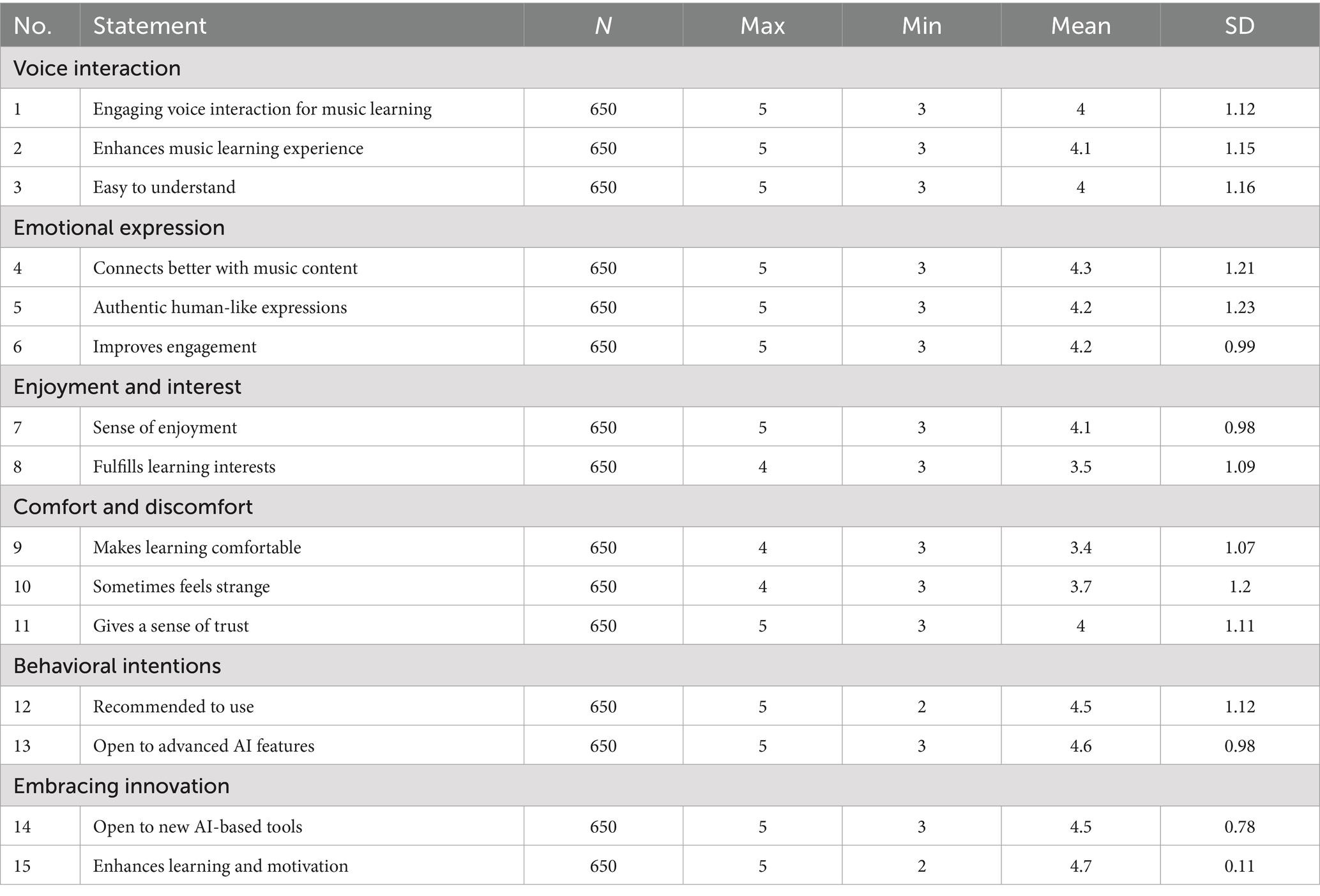
Table 3. Students’ perceptions of the influence of AIGC on learners’ willingness to embrace AIGC (SOR model).
Table 3 shows that students had mostly positive views across the SOR dimensions, with mean scores between 3.4 and 4.7. The Behavioral Intentions items received the highest scores, including being open to advanced AI features (M = 4.6, SD = 0.98) and being willing to recommend AIGC use (M = 4.5, SD = 1.12). This suggests that students are likely to adopt AIGC despite some doubts. Voice Interaction and Emotional Expression also received positive evaluations (M = 4.0–4.3), indicating that anthropomorphic features enhanced engagement and helped students connect with each other. Conversely, the lowest scores were recorded in the Comfort and Discomfort dimension (M = 3.4–3.7), highlighting ongoing discomfort with the human-like attributes of AIGC. This ambivalence demonstrates the dual role of anthropomorphic stimuli as facilitators of engagement and sources of discomfort. The findings within the SOR framework indicate that positive cognitive evaluations (e.g., usefulness, ease of use, trust) promote adoption, while affective discomfort persists as a moderating factor.
Furthermore, descriptive statistics regarding the students’ perceptions of the influence of AIGC on learners’ willingness to embrace AIGC (SOR model) are presented separately for each dimension, with an average score of 3.97. The mean score of each item is presented in Table 4.
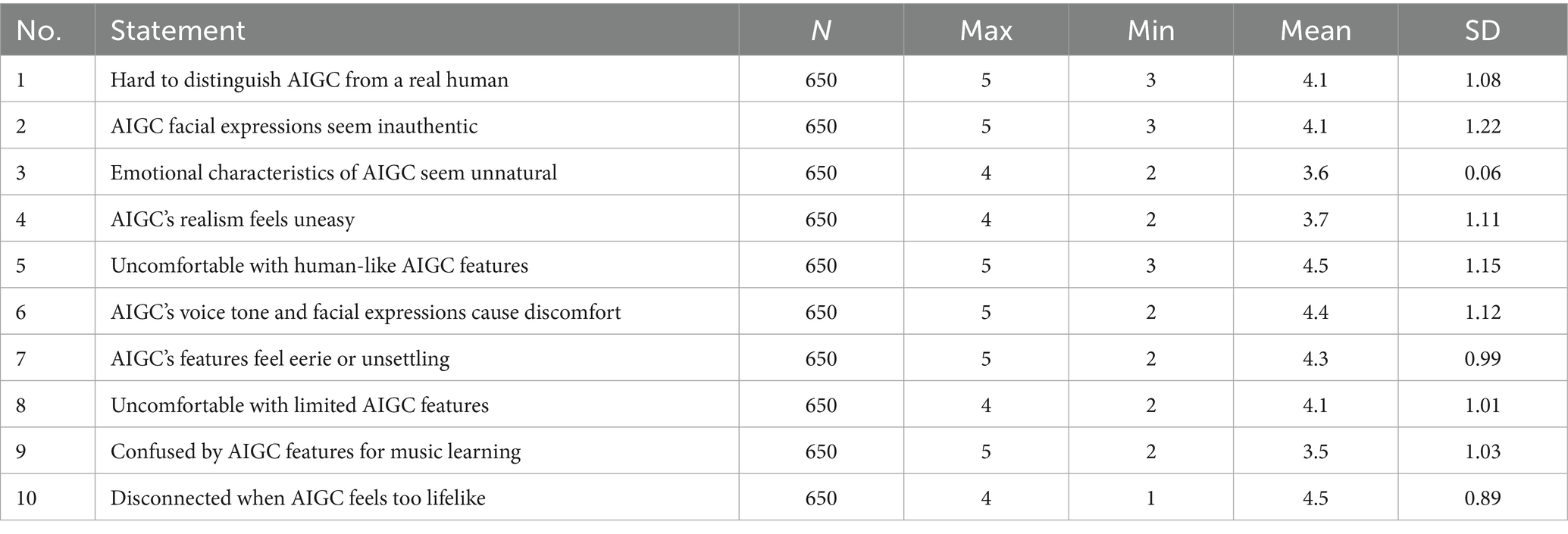
Table 4. Students’ perceptions of the influence of AIGC on learners’ willingness to embrace AIGC (SOR model).
Table 4 shows students’ perceptions of the uncanny valley effect in relation to AIGC, with an average score of 3.97. The results indicate that many students had difficulty distinguishing AIGC from real people (M = 4.1, SD = 1.02). Students often perceived emotional expressions and facial features as inauthentic or inconsistent, with average scores of 4.1 and 3.6, respectively. They also reported discomfort with how realistic AIGC appeared (M = 3.7, SD = 0.95). The most disturbing aspects were human-like traits such as facial expressions and voice tone, which received mean scores of 4.4 to 4.5. Some features were described as “spooky” or “unsettling” (M = 4.3, SD = 1.08), and limited functionality also contributed to dissatisfaction (M = 4.1, SD = 1.12). Students reported confusion when AIGC was used for learning music (M = 3.5, SD = 0.93). When AIGC appeared too real, they reported feeling disconnected (M = 4.5, SD = 0.99). These results confirm that anthropomorphic realism can induce considerable discomfort, aligning with the uncanny valley effect. AIGC’s human-like features can increase engagement in some ways but may also reduce the perceived authenticity and trustworthiness of music learning.
Qualitative analysis
Qualitative analysis adopts the thematic analysis (Braun and Clarke, 2006), which provides a six-phase process for thematic analysis: (1) familiarization with the data, (2) initial coding, (3) theme search, (4) theme review, (5) theme naming and definition, and (6) report preparation.
Thirty-five students from five Chinese universities were interviewed, and the demographic details are provided in Chapter 3. This section summarizes the demographics of the interview respondents, categorized by age group (20 men and 10 women), sex, field of expertise, and academic level, as illustrated in Figures 1–3.
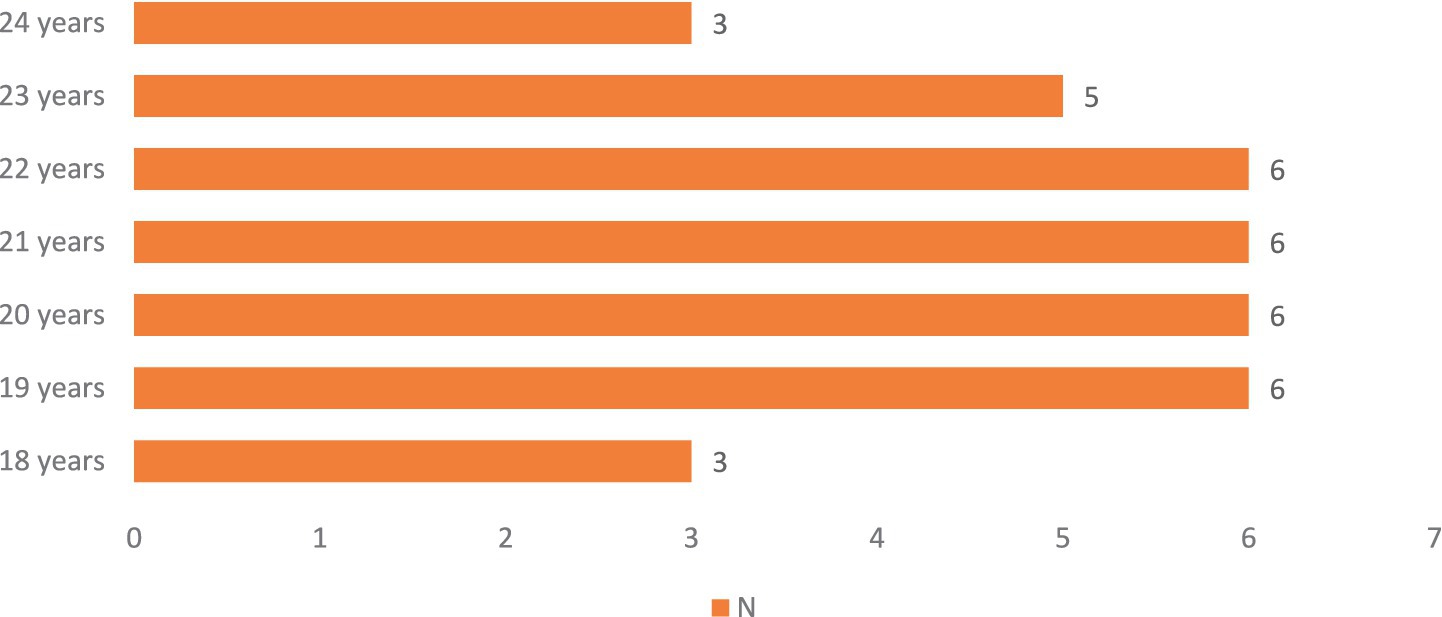
Figure 1. Demographic profile of participants by age. Subsequently, the distribution of respondents according to their area of specialization,
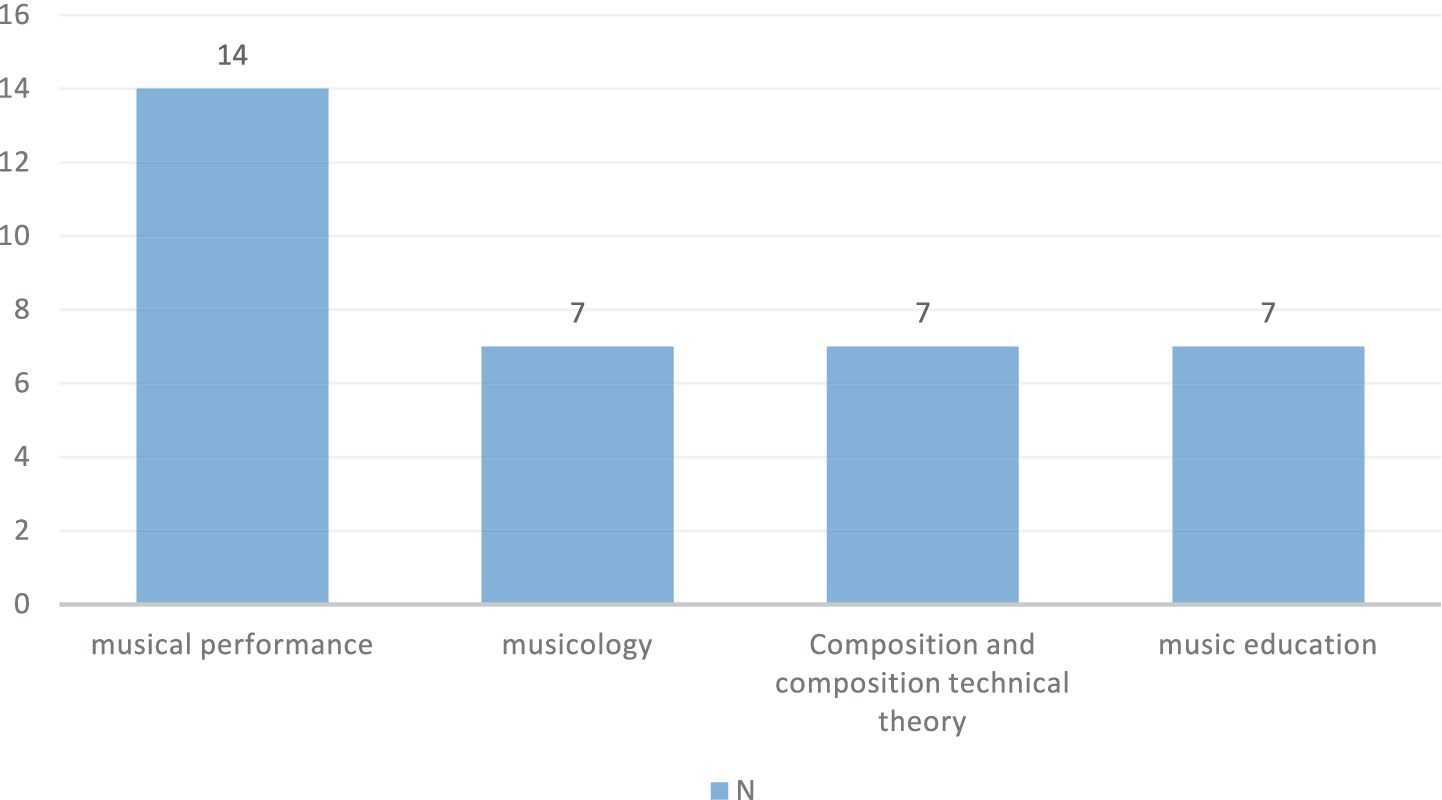
Figure 2. Demographic profile of participants by specialty. Subsequently, participants are categorized by academic year (sophomore, freshman, senior, and junior).
First-year students utilize AIGC to study and communicate with instructors, whereas sophomores view AIGC emotions as tools and engage in peer discussions. Juniors utilize AIGC emotions to reflect on and learn from algorithmic and personal experiences, while seniors utilize AIGC as a challenge to broaden their artistic viewpoint.
Subsequently, the interview transcripts are presented according to grade categories, which is more equitable than the distribution based on sex, age, or specialty groups (Table 5).
Sophomores acknowledge the possibility of exploring new emotions while preserving their individual style. They view AIGC emotions as tools and share their experiences with classmates. Freshmen talk about their uneasiness with peers or instructors and use AIGC emotions as learning tools. Seniors view AIGC as a challenge to extend their artistic horizons, using the distinctions between AIGC and human emotions to enhance their artistic expression. Juniors engage in introspection by examining their own feelings and comparing them to those produced by algorithms using AIGC’s emotive components.
Code and theme of transcript interview
Following the interview transcript, the subsequent stage is to produce preliminary codes and identify the themes. The outcomes of the initial code generation and the themes derived from the interview findings are presented in Table 6.
Learners concentrate on valuing AIGC’s functionality rather than its form to overcome uneasiness with the emotional component of anthropomorphic AIGC in music education. They employ a hybrid strategy, tailoring the AIGC system to meet their requirements and combining it with peer or instructor input. Iterative feedback loops reduce discomfort and improve learning, and familiarity with AIGC technology increases confident interactions.
Review and define the theme
Five themes emerged from the generated codes relevant to the dominant codes identified. These themes are presented in Table 7.
Learners must change their mindset to prioritize AIGC’s usefulness over human-like mimicry and focus on how it enhances learning to integrate it successfully into music education. They use a hybrid strategy combining AIGC with peer or teacher input, utilizing AIGC’s capabilities and human insights. By modifying settings and adding particular content, learners adapt AIGC systems to suit their own requirements and learning objectives. Knowledge of AIGC technology optimizes the learning process and fosters more confident interactions. Furthermore, learners can reduce discomfort, adjust strategies, refine skills, and become more at ease using AIGC tools through iterative feedback loops from AIGC and other sources.
Integrating quantitative and qualitative analysis to address the research question
RQ 1: How do Chinese undergraduate music major students perceive the usefulness and ease of using AI-generated content (AIGC) in their music course, with anthropomorphic features (such as voice interaction and emotional expression)?
We examined the experimental results of a questionnaire completed by 650 Chinese undergraduate music major students regarding the perceived usefulness and ease of use of anthropomorphic features (voice interaction, emotional expression, etc.) in the AIGC-based music course. The “Perceived Usefulness” construct had three key indicators: (1) the characteristic of voice interaction making music learning more interesting (average score 4.7); (2) immediate feedback facilitating music learning (average score 4.6); (3) usefulness of anthropomorphic AIGC in comprehending specific skills in music training, such as rhythm exercises, ear training, and music theory (average score 4.5). These results emphasize that these features are highly beneficial for students’ learning.
The ease of use was reflected by two strong indicators: (1) user-friendly voice interaction enabling participants to gain insights with a lower learning curve and minimal practice (average score of 4.35); (2) ability to support emotional expression, providing insights into music interpretation nuances (average score of 4.3). These findings suggest that students are more likely to adopt AI-generated content in their music learning due to AIGC’s anthropomorphic characteristics. However, students also recognize the need to ensure these features remain practical and accessible for all learners.
RQ 2: From the perspective of SOR, how do anthropomorphic features in AIGC influence the Chinese undergraduate music major students’ willingness to use the technology?
Based on a questionnaire with 650 students, Chinese undergraduate music majors perceive that anthropomorphic characteristics present in AI-generated content (AIGC) strongly influence their willingness to use the technology. Overall, the third dimension—“Willingness with the Technology (Response)”—reflects a more positive perception than “Behavioral Intention” and “Embracing Innovation.” This was especially prominent for features such as voice interaction and emotional expression of anthropomorphic AIGC, all of which have an average score above four, as given by students. In the “Emotional Response (Organism)” dimension, Enjoyment and Interest received positive ratings (average range: 3.4–4.1). In general, students showed high trust and enthusiasm for using this technology as part of their music education.
The higher scores on AIGC feature utilization recommendations, functionality acceptance, music learning outcomes, and motivation indicators indicate that students perceive significant benefits from using these things. Overall, incorporating voice interaction and emotional expression increased comfort and interest within the music learning experience. However, some hurdles remain before achieving a fully relaxed learning experience. Moreover, considering that the first (Stimulus) and second (Organism) dimensions have positive evaluations, it can be inferred that, although imperfect, anthropomorphic features provide a good impression of interactivity and motive behavior. There is potential for further improvements and innovation in these features to improve the student experience.
RQ 3: To what extent does the anthropomorphic AIGC technology evoke the uncanny valley effect among the Chinese undergraduate music majors? How do they address this issue of the uncanny valley effect?
However, the questionnaire results among Chinese undergraduate music students found that most felt physically uncomfortable or psychologically distressed when learning or applying AIGC technology. This discomfort stemmed mainly from AIGC’s human characteristics—such as body language and interaction—appearing more static and cold than the warm, smooth human-led instruction. Although students embraced the technological and creative advantages brought by AIGC, they felt disturbed by its near-human nature, specifically the use of avatars and the instructional feedback generated by AIGC. The discomfort probably originates from the discrepancy between the expectation of music learning involving human interaction and the experience offered via the current generation of AIGC technology.
Students overcame their discomfort through strategies. They valued the purpose of AIGC more than its form or appearance and approved the use of AIGC in the development of music learning. One student noted: “It was better to have AIGC with teacher or peer comments, summary, or feedback, as it sounded like a human touch, which made me feel comfortable and less of a burden in learning.” For example, students would use the AIGC system differently, based on its settings or which features were usable and matched their learning style. In the early days, familiarity with AIGC technology and its interface made people less anxious and nervous. Moreover, students also used feedback loops to learn and adapt AIGC to improve their learning process, allowing them to focus on and develop their self-confidence. These strategies embody an adaptive response to mitigating the challenges that arise from AIGC technology in music acquisition.
Discussion
The findings reveal a paradox in students’ responses to anthropomorphic AIGC. While features such as voice interaction and emotional expression were perceived as helpful in enhancing engagement in music learning, they also elicited discomfort, particularly when functionalities mimicked human gestures, expressions, or social interactions, which were regarded as rigid and cold compared with human instruction (Chen et al., 2024; Wang and Chen, 2024). Students reported unease with avatars and tutorial comments (Chunlei et al., 2025; Gao, 2023), confirming that human likeness can provoke alienation consistent with the uncanny valley effect (Opthalmologist et al., 2019; Jiang et al., 2024). This suggests that while anthropomorphism can serve as a pedagogical tool, its design must be carefully calibrated to prevent undermining students’ sense of authenticity in the learning process.
Despite these concerns, students showed that they could adapt to challenging situations. Many people put functionality ahead of form and were fine with AIGC as long as it “worked” instead of looking human-like. They used AIGC and feedback from teachers or peers, tailored the settings to fit their study habits, and created feedback loops to change how they learned, boosting their confidence and focus (Avdeeff, 2019; Tao et al., 2023). These strategies exemplify a pragmatic approach for incorporating AIGC into music education, demonstrating how cultural relevance and technological familiarity alleviated apprehension and enabled students to interact with it more confidently (Chunlei et al., 2025; Gao, 2023). This adaptation also shows that acceptance is not automatic but rather an active negotiation between students’ expectations and the technology’s capabilities.
Anthropomorphic characteristics were perceived as both sources of discomfort and enablers of engagement. Voice interaction and affective responses were regarded as valuable for facilitating learning, encouraging students to investigate additional AI tools (Nugroho, 2024; Zeng, 2024). However, the high ratings of discomfort with realism (M = 4.4–4.5) underscore the fact that anthropomorphic qualities continue to be a double-edged weapon. This duality is indicative of the SOR mechanism, which involves the generation of positive cognitive evaluations (usefulness, ease of use) and negative affective reactions (discomfort) by the same stimulus, thereby influencing the willingness to employ the technology (Li, 2024; Soliman et al., 2024). The coexistence of acceptance and discomfort implies that students’ positive cognitive evaluations outweigh their affective disquiet, facilitating adoption despite feelings of alienation. Nevertheless, the long-term efficacy of coping strategies, such as integrating peer or teacher feedback, may depend on institutional support and iterative enhancements in AIGC design. This dynamic underscores the interaction between cognitive and affective evaluations: Although initial adoption is driven by usefulness and ease of use, unresolved discomfort could limit sustained engagement if left unaddressed.
Behavioral intention was identified as a particularly robust predictor of adoption. In accordance with TAM and UTAUT, students who perceived AIGC as user-friendly and beneficial demonstrated a greater willingness to employ it (Taherdoost, 2018; Wang and Chen, 2024). The automated feedback and repetitive exercises of AIGC were considered beneficial for developing rhythm, pitch, and technical facility, facilitating the creative process of composition and production (Masimba and Zuva, 2021; Jiang et al., 2024). Nevertheless, the irreplaceable role of human expressiveness in music pedagogy was underscored by reduced smoothness and tenderness compared with human-based teaching due to limitations in emotional authenticity (Li, 2024). This discovery indicates that anthropomorphic AI has the potential to complement but not replace the intricate interpersonal components of music education, emphasizing the composite potential of human-AI collaboration.
These responses were additionally affected by the cultural values of the Chinese context. The role of teacher validation was reinforced by collectivism and respect for authority, which in turn influenced acceptance. Conversely, the discipline of music training increased sensitivity to the artificiality of AIGC’s emotional expressions. This cultural perspective elucidates why students were simultaneously apprehensive about the authenticity and artistry of innovative AI features and anxious to experiment with them. There were significant concerns regarding creativity and originality: Although some students were concerned that anthropomorphic AI could undermine artistry, others welcomed its potential to broaden creative horizons (Zeng, 2024; Chunlei et al., 2025). For certain individuals, the scripted and repetitive characteristics of anthropomorphic design prompted concerns regarding the authenticity of musical expression, intensifying fears that AI could diminish the emotional depth and originality traditionally valued in music education. These cultural dynamics underscore the necessity of considering the sociocultural context in which technology acceptance occurs and the importance of design strategies that align with local values and pedagogical traditions.
Overall, these results demonstrate that anthropomorphic stimuli elicit intertwined cognitive and affective responses, thereby extending the explanatory power of SOR. This study demonstrates that positive cognitive evaluations (PU, PEOU, performance expectancy) can outweigh negative affective reactions in adoption decisions by incorporating TAM and UTAUT within the SOR framework. However, discomfort remains a moderating factor that necessitates cautious consideration. This integration theoretically enhances current models by addressing the paradox of simultaneous acceptance and disquiet, a topic frequently disregarded in previous research (Soliman et al., 2024; Soliman et al., 2025). In practical terms, the findings indicate that anthropomorphic AIGC in music education should be meticulously calibrated. To increase engagement, vocal interaction and emotional expression can be employed, while overly realistic avatars or gestures should be moderated to prevent the initiation of discomfort. These insights offer policymakers and educators in China guidance on developing curricula and regulations that leverage AIGC’s benefits for creativity and innovation while maintaining authenticity and trust.
Conclusion
This study examined Chinese undergraduate music students’ perceptions of anthropomorphic features in AIGC, their acceptance of the technology, and the extent to which AIGC evokes the uncanny valley effect. The findings demonstrate that anthropomorphic features such as voice interaction and emotional expression enhanced students’ motivation and engagement in music learning while simultaneously generating discomfort with specific human-like characteristics, including avatars and explainability. Overall, students recognized both the technological and creative benefits of AIGC and its emotional limitations compared to human interaction. Its reliance on self-reported, cross-sectional data from a single group of Chinese undergraduate music students restricts this study’s causal inference and generalizability. Future research should build on these findings by extending the Stimulus–Organism–Response (SOR) framework to include constructs such as trust, creativity, and cultural context. Longitudinal studies are needed to track how students’ perceptions evolve with prolonged exposure to AIGC.
Data availability statement
The raw data supporting the conclusions of this article will be made available by the authors, without undue reservation.
Ethics statement
The studies involving humans were approved by Institute of Science Innovation and Culture, RMUTK. The studies were conducted in accordance with the local legislation and institutional requirements. The participants provided their written informed consent to participate in this study. Written informed consent was obtained from the individual(s) for the publication of any potentially identifiable images or data included in this article.
Author contributions
JT: Writing – review & editing, Conceptualization, Investigation, Writing – original draft. CA: Resources, Data curation, Writing – review & editing, Supervision. YL: Formal analysis, Writing – review & editing, Visualization, Funding acquisition. SS: Methodology, Data curation, Validation, Project administration, Software, Writing – review & editing.
Funding
The author(s) declare that no financial support was received for the research and/or publication of this article.
Conflict of interest
The authors declare that the research was conducted in the absence of any commercial or financial relationships that could be construed as a potential conflict of interest.
Generative AI statement
The authors declare that no Gen AI was used in the creation of this manuscript.
Any alternative text (alt text) provided alongside figures in this article has been generated by Frontiers with the support of artificial intelligence and reasonable efforts have been made to ensure accuracy, including review by the authors wherever possible. If you identify any issues, please contact us.
Publisher’s note
All claims expressed in this article are solely those of the authors and do not necessarily represent those of their affiliated organizations, or those of the publisher, the editors and the reviewers. Any product that may be evaluated in this article, or claim that may be made by its manufacturer, is not guaranteed or endorsed by the publisher.
References
Abiagom, C. N., and Ijomah, T. I. (2024). Enhancing customer experience through AI-driven language processing in service interactions. Open Access Res. J. Eng. Technol. 7, 014–021. doi: 10.53022/oarjet.2024.7.1.0027
Agrebi, S., and Jallais, J. (2015). Explain the intention to use smartphones for mobile shopping. J. Retail. Consum. Serv. 22, 16–23. doi: 10.1016/j.jretconser.2014.09.003
Ahmad, T., Zhang, D., Huang, C., Zhang, H., Dai, N., Song, Y., et al. (2021). Artificial intelligence in sustainable energy industry: status quo, challenges and opportunities. J. Clean. Prod. 289:125834. doi: 10.1016/j.jclepro.2021.125834
Alavi, M., and Leidner, D. (1999). Knowledge management systems: issues, challenges, and benefits. Commun. Assoc. Inf. Syst. 1:107. doi: 10.17705/1cais.00107
Algerafi, M. A. M., Zhou, Y., Alfadda, H., and Wijaya, T. T. (2023). Understanding the factors influencing higher education students’ intention to adopt artificial intelligence-based robots. IEEE Access 11, 99752–99764. doi: 10.1109/ACCESS.2023.3314499
Anantrasirichai, N., and Bull, D. (2022). Artificial intelligence in the creative industries: a review. Artif. Intell. Rev. 55, 589–656. doi: 10.1007/s10462-021-10039-7
Anderson, C. A. (1995). A broad approach to environmental psychology. Contemp. Psychol. 40, 781–782. doi: 10.1037/003889
Avdeeff, M. (2019). Artificial intelligence & popular music: SKYGGE, flow machines, and the audio uncanny valley. Art 8:130. doi: 10.3390/arts8040130
Braun, V., and Clarke, V. (2006). Using thematic analysis in psychology. Qual. Res. Psychol. 3, 77–101. doi: 10.1191/1478088706qp063oa
Cai, Y. (2024). The absence of traditional music: the issue of westernization in primary school music education in China. J. Educ. Hum. Soc. Sci. 35, 595–601. doi: 10.54097/vs2f7q45
Chen, X., Hu, Z., and Wang, C. (2024). Empowering education development through AIGC: a systematic literature review. Educ. Inf. Technol. 29, 17485–17537. doi: 10.1007/s10639-024-12549-7
Cheng, L. (2025). The impact of generative AI on school music education: challenges and recommendations. Arts Educ. Policy Rev. 1–8. doi: 10.1080/10632913.2025.2451373
Chunlei, L., Wen, W., Xingchen, L., Micro-renewal, R., Village, W., and Rural, A. (2025). Exploration of Rural Micro-renewal in the context of AIGC and cross-media integration: a case study of an artistic practice in Wupu Village. J. Artif. Int. Prac. 8, 22–32. doi: 10.23977/jaip.2025.080103
Gao, R. (2023). AIGC technology: reshaping the future of the animation industry. Highl. Sci. Eng. Technol. 56, 148–152. doi: 10.54097/hset.v56i.10096
Jian, M. J. K. O. (2023). Personalized learning through AI. Adv. Eng. Innov. 5, 16–19. doi: 10.54254/2977-3903/5/2023039
Jiang, Q., Zhang, Y., Wei, W., and Gu, C. (2024). Evaluating technological and instructional factors influencing the acceptance of AIGC-assisted design courses. Comput. Educ. Artif. Int. 7:100287. doi: 10.1016/j.caeai.2024.100287
Jing, Y. (2023). The impact of music education on students’ academic performance and academic motivation: a quantitative study. Print). Int. J. Soc. Sci. Humanit. Res. 11, 121–125. doi: 10.5281/zenodo.10021657
Joshi, A. A., Computer, B. T., and Artificial, S. (2024). The impact of generative AI on creative industries: trends and future directions. Int. J. Creat. Res. Thoughts 12, 99–104. www.ijrcrt.org
Lee, L., and Ho, H. J. (2023). Engagement with music technology in special educational settings for children with disabilities †. Eng. Proc. 55:5027. doi: 10.3390/engproc2023055027
Leoste, J., and Heidmets, M. (2019). The impact of educational robots as learning tools on mathematics learning outcomes in basic education. Lecture Notes Educ. Technol. 2019, 203–217. doi: 10.1007/978-981-13-7361-9_14
Li, W. (2024). A study on factors influencing designers’ behavioral intention in using AI-generated content for assisted design: perceived anxiety, perceived risk, and UTAUT. Int. J. Hum.-Comput. Interact. 41, 1064–1077. doi: 10.1080/10447318.2024.2310354
Liu, Y. (2024). Research on game development and revenue based on generative artificial intelligence: a case study of Netease. J. Educ. Hum. Soc. Sci. 35, 434–440. doi: 10.54097/51m2s794
Masimba, F., and Zuva, T. (2021). Individual acceptance of technology: a critical review of technology adoption models and theories. Ind. J. Hum. Soc. Sci. 2, 37–48.
McCord, M. (2006). “Technology acceptance model” in Handbook of Research on Electronic Surveys and Measurements. eds. R. A. Reynolds, R. Woods, and J. D. Baker (London: IGI Global), 306–308.
Mehrabian, A., and Russell, J. A. (1974). An approach to environmental psychology. Cambridge, MA: The MIT Press.
Merchán Sánchez-Jara, J. F., González Gutiérrez, S., Cruz Rodríguez, J., and Syroyid Syroyid, B. (2024). Artificial intelligence-assisted music education: a critical synthesis of challenges and opportunities. Educ. Sci. 14:1171. doi: 10.3390/educsci14111171
Mishrif, A., and Khan, A. (2023). Technology adoption as survival strategy for small and medium enterprises during COVID-19. J. Innov. Entrep. 12:317. doi: 10.1186/s13731-023-00317-9
Mori, M., Mac Dorman, K. F., and Kageki, N. (2012). The uncanny valley. IEEE Robot. Automation Magazine 19, 98–100. doi: 10.1109/MRA.2012.2192811
Nadzeri, M. B., Musa, M., Meng, C. C., and Ismail, I. M. (2023). Interactive mobile technologies. Int. J. Interact. Mob. Technol. 17, 135–154. doi: 10.3991/ijim.v17i03.38953
Nugroho, Y. Y. T. (2024). “The use of AI in creating music compositions: A case study on Suno application,” in Proceedings of the 7th celt international conference (CIC 2024), advances in social science, education and humanities research 897, CIC.
Opthalmologist, C., Officer, C. M., and Chitrakoot, U. P. (2019). Bridging the maturity-expectation gap: generative AI in strategic decision making for public R&D interview review. SSRN 3, 37–46.
Plintz, N., and Ifenthaler, D. (2023). “Leveraging emotions to enhance learning success in online education: a systematic review,” in 20th International Conference on Cognition and Exploratory Learning in Digital Age, CELDA 2023, CELDA, 345–352.
Rençber, H. (2020). United theory of acceptance and use of technology. Consumer Behav. Models 22, 181–192. doi: 10.1007/978-3-030-10576-1_300692
Sanganeria, M., and Gala, R. (2024). “Tuning music education: AI-powered personalization in learning music,” in 38th conference on neural information processing systems (NeurIPS 2024) creative AI track, NeurIPS.
Singh, A. P., Saxena, S., and Saxena, R. (2024). The future of learning: AI-driven personalized education. Asian J. Current Research 9, 207–226. doi: 10.56557/ajocr/2024/v9i49018
Soliman, M., Ali, R. A., Khalid, J., and Noipom, T. (2024). Modelling continuous intention to use generative artificial intelligence as an educational tool among university students: findings from PLS-SEM and ANN. J. Comput. Educ. 12, 1–32. doi: 10.1007/s40692-024-00333-y
Soliman, M., Ali, R. A., and Noipom, T. (2025). Unlocking AI-powered tools adoption among university students: a fuzzy-set approach. J. Inf. Commun. Technol. 24, 1–22. doi: 10.1186/s40561-024-00357-y
Taherdoost, H. (2018). A review of technology acceptance and adoption models and theories. Procedia Manufacturing 22, 960–967. doi: 10.1016/j.promfg.2018.03.137
Tao, W., Gao, S., and Yuan, Y. (2023). Boundary crossing: an experimental study of individual perceptions toward AIGC. Front. Psychol. 14, 1–12. doi: 10.3389/fpsyg.2023.1185880
Venkatesh, V., Morris, M. G., Davis, G. B., and Davis, F. D. (2003). User acceptance of information technology: Toward a unified view. MIS Quarterly, 27, 425–478. doi: 10.2307/30036540
Wang, S.-F., and Chen, C.-C. (2024). Explore the driving factors of designers’ AIGC usage behavior based on SOR framework. Front. Comput. Sci. 6:1417016. doi: 10.3389/fcomp.2024.1417016
Wang, X., Dai, C., and Bao, L. (2025). Technology empowerment and problem derivation: a visual comparative analysis of AIGC research status and trends in China and abroad. Inf. Discov. Deliv. 9:72. doi: 10.1108/IDD-05-2024-0072
Yan, Y., and Liu, H. (2024). Ethical framework for AI education based on large language models. Educ. Inf. Technol. 30:0123456789. doi: 10.1007/s10639-024-13241-6
Zamani, S. Z. (2022). Small and medium enterprises (SMEs) facing an evolving technological era: a systematic literature review on the adoption of technologies in SMEs. Eur. J. Innov. Manag. 25, 735–757. doi: 10.1108/EJIM-07-2021-0360
Keywords: generative artificial intelligence (GAI), AI-generated content (AIGC), uncanny valley effect, music education, students’ acceptance
Citation: Tan J, Anyanwu CC, Liu Y and Suryanti S (2025) How anthropomorphic AI features affect music students’ acceptance: a study among Chinese undergraduates. Front. Educ. 10:1649747. doi: 10.3389/feduc.2025.1649747
Edited by:
Aslina Baharum, Sunway University, MalaysiaReviewed by:
Parinya Siriattakul, North Bangkok University, ThailandMohamed Soliman, Prince of Songkla University, Thailand
Copyright © 2025 Tan, Anyanwu, Liu and Suryanti. This is an open-access article distributed under the terms of the Creative Commons Attribution License (CC BY). The use, distribution or reproduction in other forums is permitted, provided the original author(s) and the copyright owner(s) are credited and that the original publication in this journal is cited, in accordance with accepted academic practice. No use, distribution or reproduction is permitted which does not comply with these terms.
*Correspondence: Clinton Chidibere Anyanwu, Y2xpbnRvbi5jQG1haWwucm11dGsuYWMudGg=
 Jingyuan Tan1
Jingyuan Tan1 Clinton Chidibere Anyanwu
Clinton Chidibere Anyanwu Yaoping Liu
Yaoping Liu Sri Suryanti
Sri Suryanti